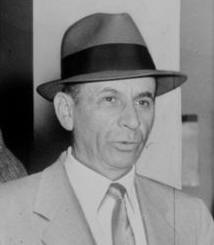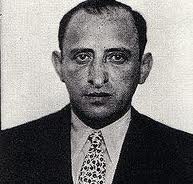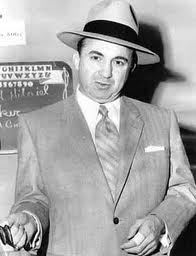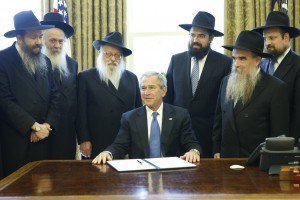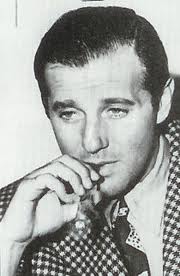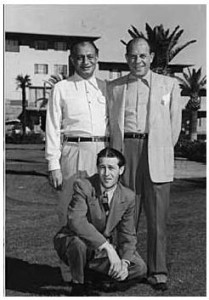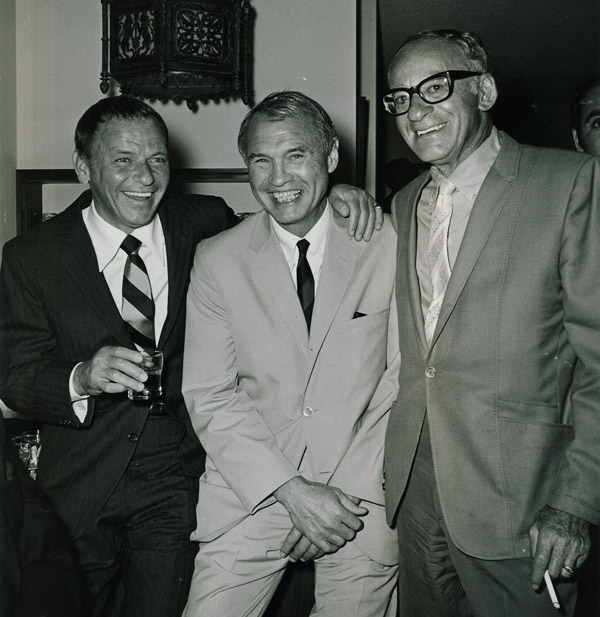Elie Wiesel on The Jewish Mafia
Friday, January 21st, 2011
By Carolyn Yeager
copyright 2011 carolyn yeager
Updated on Jan. 24, 2011
What makes Jews special? Are they like “other people” or are they not? Here is one confusing answer from the world’s most famous holocaust survivor.
As I was compiling the particular sections in All Rivers Run to the Sea that reveal, in one way or another, Elie Wiesel’s sometimes certain, sometimes probable links to the Mossad and it’s precursors, I came across this interesting passage that shows something a little different—but equally important to the understanding of Wiesel’s views on crime.
Thus, I’m taking a short detour on the way to the promised “Elie Wiesel and the Mossad,” part two, but I will get there eventually.
On page 288 and 289 of Wiesel’s first memoir dealing with his life up to 1968 or thereabouts,1 he writes that, after his arrival in New York in 1956, his editor in Israel, Dov, suggested a report on organized crime in America. Wiesel tells us that when doing the research he discovered some Jewish names among the underground crime figures, even some working for the Irgun.
I’m sure that doesn’t surprise most of you reading this, and certainly not me, but Wiesel claims a different response:
These revelations came as a shock to me. I simply could not imagine a Jew becoming a hired killer. Yes, I had too idealistic a view of Jews, but the fact is that in Eastern Europe my people might have been criticized for just about anything, but not involvement in murders. Jews may have been guilty of lying or cheating, fraud or smuggling, theft or perjury, but murder was unimaginable.
Elie—who had worked for the Irgun for years in Paris; followed every fragment of news about the events in Palestine from at least 1946 on; was in communication with many of the behind-the-scenes characters responsible for the successful ascendance of the state of Israel—this man was shocked to learn that Jews were among the world’s killers, hired or not?
Left: Meyer Lansky, boss of the Jewish crime syndicate, was a Polish Jew born in Russia who emigrated to the U.S. in 1911; Center: Meyer “Mickey” Cohen, born in Brooklyn to Ukrainian Jewish parents, was a notorious mobster; Right: Moe Sedway, Lansky’s faithful lieutenant.
Wiesel is pretending to an idealism he had to have lost long ago, if he ever had it. When he says “I could not imagine a Jew becoming a hired killer,” the first thing that pops into my mind is Condoleezza Rice saying “We could not imagine an airplane being used as a weapon by smashing it into a skyscraper.”
Yet, he readily admits that Jews lie, cheat, commit fraud and acts of smuggling, theft and perjury (see Is Elie Wiesel a Perjurer?). I guess, in Wiesel’s mind, these crimes are not as bad as murder. But any one of them can result in death to the parties victimized by such crimes, and anyone committing them has to know the harm they are doing to these others. We also know that lying and cheating are commonly done by Jews against non-Jews, and that the Talmud and the Torah not only excuse these crimes but in some cases recommend them! Fraud, smuggling and perjury necessarily combine both lying and cheating.
In a way, Wiesel, as a religious Jew well-versed in the scriptures, seems to be excusing these practices because they are less than murder, the one crime Jews should never do. But yet killing for the attainment of Eretz Yisrael, as did all the “resistance fighters” he so admired, must be acceptable to his Zionist eyes.
Let’s see if there’s an answer in his following paragraph:
I like to think that what accounts for this virtual absence of blood crimes in our communities was perhaps related to the commandment revealed at Sinai: Thou shalt not kill. The voice of God sounds and resounds in our collective memory. But then what accounts for the present reality? The fact is that in modern Israel acts of murder do occur. True, there are few such cases, but even one is too many. It seems we are finally becoming a people like any other, neither better nor worse. Does this mean we are not “the chosen people?” No, we are, but only in the sense that Anglo-Jewish writer Israel Zangwill attributes to the term: “the people that chooses itself, its destiny and mission.” And as important, in the sense of teaching all peoples that they, too, must aspire to reach beyond themselves, to lift themselves ever higher, and to see themselves as unique.
Wiesel tells us that Jews became murderers when they became more like the rest of us. Does history bear that out? Can it not be demonstrated that what accounts for the absence of blood crimes within Jewish communities is related to the commandment not to do harm to your fellow Jews—but the same does not apply to non-Jews. The Ten Commandments were applied to fellow Hebrews, not to outsiders. This is more likely what accounts for the present reality. Jews in the Diaspora have plenty of targets which are not forbidden to them to harm.
But Wiesel is complaining that murders now occur among Jews in modern Israel. [And we are again served up that obligatory cliché: “Even one is too many.”] He explains this downward drift by saying “we are finally becoming more like other people.” But to assure they remain “the chosen,” he is willing to make quite a concession—that it is not God who chose that Abramic tribe centuries ago, but they have chosen themselves.
Goyim have been saying that for a long time, but little did we know that Elie Wiesel would one day agree! But does he really, or did he talk himself into a corner, then try to talk himself out of it? He concludes that the Jewish mission is to “teach all peoples that they, too, must aspire beyond themselves; they, too, should lift themselves higher; they, too, should see themselves as unique. I had not thought we were trailing so far behind those darn Jews. Is it because Jews do not murder their own for hire? That may be true. But I will venture to say that Jews are routinely implicated in causing non-Jews to attack and murder each other. That cannot be OK. And there is the ironic “fact,” as Wiesel says elsewhere in his memoir, that it was Cain who slew his brother Abel at the beginning of the Jewish story.
Chabad-Lubavitch members visit the White House regularly bearing sentimental mementos, such as menorahs, to make sure their interests are not forgotten. The Chabad originated in Russia and are of the same Hasidic sect as Elie Wiesel. Is it their uniqueness that Wiesel thinks the Goyim should aspire to?
Elie Wiesel goes to Las Vegas in 1957
On pages 301-2, I found another interesting passage that adds to the above. After his first year in New York, Wiesel’s editor Dov, with his wife Leah, came from Israel for a long visit. Dov was fascinated with all things American. Wiesel took them to concerts and restaurants in New York; then Dov rented a car for a six-week cross country trip for the three of them. One place they stopped was Las Vegas, which, after the war, was built up mainly by Jewish crime figures.
In 1946, Jewish gangster “Bugsy” Siegel, with help from friend and fellow mob boss Meyer Lansky, used dirty money laundered through Mormon-owned banks to build The Flamingo gambling casino. Siegel experienced financial difficulties and died in a hail of gunfire in Los Angeles, CA. Other mobsters saw the potential that gambling offered in Las Vegas. From 1952 to 1957, still using some Mormon bankers and adding Teamsters Union funds, they built the Sahara, the Sands, the New Frontier, the Royal Nevada, the Showboat, The Riviera, The Fremont, Binion’s Horseshoe, and finally The Tropicana. Already in 1954 over 8 million people were visiting Las Vegas yearly, pumping 200 million dollars into casinos. By 1957, when Wiesel arrived, it was the heyday of the flashy, openly-mobster-run Vegas. 2
Wiesel found comrades with strong Israeli ties there, as he does everywhere. He writes sparingly about it:
There was Las Vegas and its slot machines, available even in the rest rooms. Men and women were standing in dazzlingly bright casinos, betting a year’s salary or more on a little ball that leaps and dances about indifferently, stupidly, before coming to rest on a number , any number. Wherever you turn, you see frozen faces and trembling hands. The casino in Monte Carlo 3 is the playground of the rich, who seem burdened by their wealth. In Las Vegas one sees ordinary people fed up with not being rich.
At the Sands Hotel we dined with Hank Greenspun, a powerful man in the city who was the owner of the daily Las Vegas Sun, who told us of his clandestine activities in support of Israel. In 1948 he was involved in an illegal arms shipment, for which he was indicted and sentenced to several year in prison. Of this he was very proud.
Well known Las Vegas Jewish crime figures. Left: Benjamin “Bugsy” Siegel; Right: Israel “Icepick Willie” Alderman, Joe Rosenberg, Gus Greenbaum
Below: Frank Sinatra, Hank Greenspun and Eddie Moss, bookie and casino manager of the Sahara Hotel.
Greenspun may have been sentenced to prison, as Wiesel says, but he didn’t serve any time. According to Wikipedia, in 1947 he was shipping guns and airplane parts to the Haganah fighters in Israel. He was arrested and convicted of violating the Neutrality Acts. Fined a relatively small sum of $10,000, he received no prison time. In 1961, President John F. Kennedy pardoned Greenspun, and when he died in 1989, former Israeli PM Shimon Peres called him “a hero of our country and a fighter for freedom.” Greenspun purchased the Las Vegas Sun newspaper in 1949, which he ran until his death. 4
Wiesel doesn’t tell us how he and his editor managed to link up with Hank Greenspun, but then it goes without saying. By 1957, Greenspun was able to entertain and regale visiting Jews and Israelis of note with his illegal exploits for terrorists operating in Palestine. A few years later, his crime was washed away by a U.S. president.
Endnotes:
1. Elie Wiesel, Memoirs: All Rivers Run to the Sea, Alfred A. Knopf, 1995. 418 pp.
2. http://en.wikipedia.org/wiki/History_of_Las_Vegas
3. He means the one in Monaco, on the French coast.
4. http://en.wikipedia.org/wiki/Hank_Greenspun
Category Featured | Tags: Tags: All Rivers Run to the Sea, Hank Greenspun, Irgun, Jewish crime, Las Vegas, Meyer Lansky,
Social Networks: Facebook, Twitter, Google Bookmarks, del.icio.us, StumbleUpon, Digg, Reddit, Posterous.

